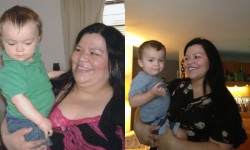 Small daily improvements are the key to staggering long-term results. ~ Unknown
Small daily improvements are the key to staggering long-term results. ~ Unknown
Many people have profoundly expressed the importance of gradual change. Dr. Martin Luther King said in his I Have a Dream speech that people would one day be judged by the content of their character rather than by the color of their skin. That change took years. He didn’t believe in forcing change instantly. He believed in a message that would move people to change.
Lyricist Bob Dylan also understood that lasting change happened gradually. From his song Blowin’ in the Wind, we learned that we may never know how long change could take to transpire because the answer is blowin’ in the wind.
Change takes time. It’s a slow, steady process that can test your patience and wear down your will. Some people believe that once they reach their intermittent or final goal weight that there will be a dramatic ‘change’ in how they perceive things. They think they will see their bodies, their attitude toward food, or their relationships in a new way. These people feel that at their goal weight, their bodies will automatically change the way they handle food. They forget the years of conditioning that it took to get their bodies unhealthy.
I am here to tell you that this just isn’t the case. Change is gradual. It is powered by lots of ‘baby steps’ (oh come on, you just have to laugh at that reference to the movie, What About Bob anyone?). You need to take baby steps daily as you make choices and discoveries about what works for your body.
My goal as a Nutritional Coach is to shift my clients’ focus from what the scale says to how our bodies, minds and hearts feel.
An interesting thing happened to one of my clients a while back. She had gone out to eat and decided to have a glass of wine with dinner. While she sipped a glass of wine, she noticed an immediate reaction of a stuffy nose. For her, that was the cue from her body to immediately stop drinking the wine. She ignored her body and continued to drink the wine. The consequence of just going on despite what the body said was a two-day recovery on the scale. Was it worth it for a glass of wine?
Can any of us honestly say we’ve never downed a cheeseburger or candy bar without a second thought? How many times have you convinced yourself that it is OK just this once, only to feel a headache or a stomach ache a few minutes after eating it? That bad, sick feeling is your cue from your body telling you to lay off that particular food item. Why aren’t you listening?
I believe we focus too much on the losing weight portion of the Protocol, while ignoring the getting healthier portion.
The protocol is an excellent detoxing mechanism that gives our bodies time to get rid of toxins, addictions, and self-deprecating behaviors. It enables us to put ourselves on a path of healing through good nutrition. We must take advantage of this gift we have been given, and start looking at food as what it is supposed to be: fuel and nourishment for the beautiful machine we find ourselves in possession of.
This brings up a few questions: Why do we find ourselves so addicted to what the scale says? Why aren’t we more interested in what we are eating to nourish our bodies? Why are our moods dictated by a number on the scale?
Remember, lasting change begins with baby steps. If you move one step forward toward your intention a little each day, things will change.
And you will get the results you desire.
If you would like additional support during your journey, why not consider joining up with the forums at Get Your Thin On!!!















